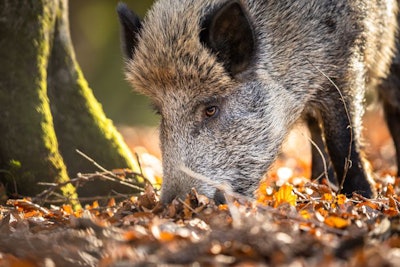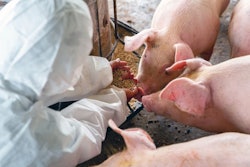
First cases of African swine fever have been detected in wild boar in the Cottbus city district in eastern Germany as the nation’s total cases in this population pass 5,000.
A wild boar found dead in the Cottbus city district in eastern Germany has tested positive for the African swine fever (ASF) virus.
This is the first infected animal to be found in the district, according to the Brandenburg state government.
Despite this development, the state authorities say there is no need to enlarge the existing core control zone or move wildlife fences. These already cover the area where the male animal was found, said the Secretary for Consumer Protection, Dr. Anje Töpfer.
However, she described the situation as “serious” after several weeks with a growing number of ASF cases in the wild boar population in Spree-Neisse — the district that surrounds Cottbus city.
Calling on hunters for help, she stressed that the further spread of cases to the north must be prevented at all costs.
For each wild boar shot within the designated ASF restriction areas, the state will pay EUR150 (US$159).
Within the state of Brandenburg, wild boar testing positive for ASF have now been discovered in half of the 18 districts. This is since the virus was first detected in Germany in September 2020.
Total virus-positive cases in the country since that time have reached 5,045, according to the national veterinary agency, the Friedrich-Loeffler Institute (as of February 24). The total includes 117 cases over the previous 28 days.
According to the same source, there have been 120 cases of ASF in wild boar across the country since the start of February. Including six cases in Cottbus since February 21, many of the latest outbreaks have been found in the Spree-Neisse district, as well as elsewhere in Brandenburg, and in the neighboring state of Saxony.
So far, just seven outbreaks have been recorded in Germany’s domestic pig population, most recently in July 2022.
ASF cases in European wild boar reach 1,700
Already this year, the total number of ASF outbreaks across Europe has reached 1,700, according to the latest update of the Animal Disease Information System of the European Commission (EC; dated February 18). Sixteen countries have registered one or more such outbreaks through this system over the past two months.
Among the nations registering new cases in this population are Poland (536 outbreaks since January 1), Germany (309), Slovakia (149), Romania (126), Italy (122) and Hungary (118).
Also reporting new ASF outbreaks to the EC System over the previous week were Estonia, Latvia, Lithuania and Serbia.
In the Czech Republic, the state veterinary service last week confirmed a fifth case of ASF in the nation’s wild boar population since November 2022. As the animal was found near the previous cases, the control area will remain unchanged. All the cases have been found in the northern region of Liberec, which borders Germany and Poland.
3 nations register new cases in domestic swine
Officially confirming new cases of ASF in domestic pigs over the past week have been Moldova, Romania and Ukraine. This is according to recent notifications to the World Organisation for Animal Health (WOAH).
All these latest outbreaks affected backyard herds, each comprising no more than nine animals.
With four outbreaks, Romania registered the most new outbreaks in this category, while Moldova and Ukraine each confirmed one affected herd.
For Ukraine, this was the first ASF outbreak in the southern region of Kherson for more than 12 months.
ASF developments in Russia
The ASF situation in Russia is not monitored by the EC’s animal disease system.
After a four-month hiatus, the virus has been detected in three wild boar found dead in the Astrakhan region, according to the WOAH notification. The infected carcasses were found in forest in the same district since February 10. Source of the infection is uncertain in this region of the Southern federal district.
In the Oryol region, two more infected wild boar were found in December, according to another Russian report to WOAH.
This brings to 10 the number of these animals testing positive for the virus in this region of the Central federal district since mid-November 2022. During that month, there were also ASF outbreaks at two large commercial farms in this region operated by Miratorg.
Russia’s veterinary authority has also declared to WOAH that the ASF situation has been “resolved” in one other area. This declaration applies to the Rostov region in the Southern federal district. Twelve wild boars there tested positive for the virus between November 2022 and mid-February.
View our continuing coverage of the global African swine fever situation.

















